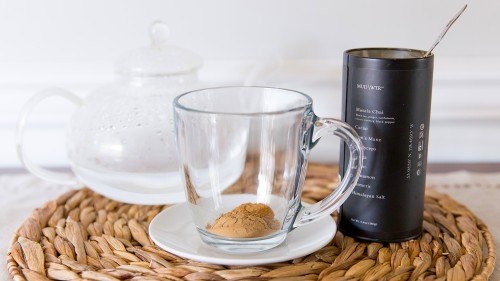What to Know About Mushroom Coffee, Explained by a Dietitian
Published on December 10, 2021
Medically Reviewed by Anthony Dugarte, MD
This mushroom drink is an earthy-tasting alternative to coffee with additional health benefits. We explain why you may want to start your day off with some mushroom coffee.


Everyone has their morning routines.
In addition to the usual steps of morning hygiene, people may do things like read a book chapter, do a morning fitness routine, or check the daily news.
Often, a warm beverage is a final touch to starting the day off right.
What if you could get the power of adaptogens or plant compounds that reduce stress into your morning brew to help you feel energized and support your health?
For people looking for an adaptogen-filled, low-caffeine alternative to a morning cup of joe, mushroom coffee may be a great choice.
Mushroom coffee is becoming increasingly popular in wellness circles because of its higher nutrient content and potential health benefits.
We review the benefits and drawbacks of mushroom coffee and discuss some popular options if you want to add this adaptogenic brew to your routine.
What Is Mushroom Coffee?
Mushroom coffee is a beverage made from a blend of powdered medicinal mushrooms and ground coffee.
Common mushrooms used in mushroom coffee include Chaga, turkey’s tail, lion’s mane, shiitake, reishi, King Trumpet, and cordyceps mushrooms.
Some mushroom coffee blends choose to include only a single kind of mushroom powder, but often you’ll find blends with multiple types of mushrooms.
Several medicinal mushrooms are edible, but it is inconvenient for many to use whole mushrooms in daily cooking to receive the adaptogenic benefits.
Even if mushrooms are a normal part of your regular diet, attempting to incorporate up to 5 different types of mushrooms daily into foods and teas is difficult.
Powdered medicinal mushrooms make it significantly easier to get the correct quantities needed to experience the health benefits of these mushrooms.
Most mushroom coffee blends include coffee but at lower amounts than typical coffee. Per serving, mushroom coffee usually has a caffeine content that settles between a standard brew and decaffeinated coffee.
Mushroom coffees can also include additional ingredients such as cacao, dandelion, chicory, black tea, and spices to round out its rich and earthy flavor and provide additional health benefits.
Mushroom Coffee Benefits
Certain mushrooms have been used in traditional medicine for thousands of years, and modern studies are now unlocking the science behind how medicinal mushrooms benefit our health.
Below, I detail some benefits from medicinal mushrooms commonly found in mushroom coffee.
May Enhance Exercise Performance
Medicinal mushrooms found in mushroom coffee may help exercise performance by increasing blood flow, acting as an antioxidant, and increasing oxygen delivery to the body.
A 2018 study examined the impact of medicinal mushrooms on exercise tolerance. Participants either took a mushroom powder blend (containing cordyceps, reishi, King Trumpet, shiitake, lion’s mane, and turkey tail) or a placebo for one to three weeks. (1)
Participants who took the mushroom blend had improved tolerance to high-intensity exercise by the end of the first week.
By three weeks, they also had increased VO2 max, meaning that their oxygen consumption was higher.
Another clinical study found that older adults taking a cordyceps-only mushroom powder had an increased anaerobic and ventilatory threshold. (2)
In other words, cordyceps increased the time it took for lactic acid buildup in the muscles and labored breathing during exercise to occur.
Summary
Small clinical studies find that mushroom powders can help increase exercise tolerance, positively impacting exercise performance.
Can Support Gut Function
Mushrooms contain polysaccharides, which are sugars that act as prebiotics or food for the gut and improve gut health.
A 2020 review on the impact of mushroom polysaccharides on the gut microbiota noted that these polysaccharides not only influenced the composition of the gut microbiota but increased short-chain fatty acid production in the gut. (3)
Turkey tail contains protein-bound polysaccharides (PSP) that act as a prebiotic for healthy gut bacteria.
A 2014 study found that participants who took a PSP supplement derived from turkey tail mushrooms for 12 weeks had small but noticeable benefits to their gut microbiome composition. (4)
An animal study found that a reishi mushroom extract reduced unhealthy bacterial imbalance in mice fed a high-fat diet, helped maintain intestinal wall integrity, and helped with detoxification. (5)
Summary
Clinical and animal studies find that medicinal mushrooms can benefit gut health by improving gut bacteria balance, increasing short-chain fatty acid production, protecting the intestinal wall, and reducing metabolic endotoxemia.
May Be Beneficial for Brain Health and Mood
Medicinal mushrooms have been widely studied for their benefits for brain health and mood.
A clinical study involving perimenopausal women found that eating a cookie containing 0.5 g of lion’s mane powder daily for four weeks helped reduce survey-reported symptoms of depression and anxiety. (6)
Lion’s mane may also help as a therapeutic supplement in depression by supporting neurotransmitter concentration and nerve growth to combat depression-related brain shrinkage and reducing brain inflammation. (7)
Mushroom supplements can also protect against neurodegenerative conditions and cognitive impairment.
Animal studies find that reishi mushrooms can protect against inflammation in the brain. They can also protect brain cells against oxidative stress and other brain injury diseases. (8, 9, 10)
Summary
Medicinal mushrooms may help symptoms of depression and anxiety and protect against neurodegenerative conditions.
Various mushrooms can do this by supporting brain growth, reducing inflammation, and supporting neurotransmitter concentrations.
Can Support a Healthy Immune Response
Common medicinal mushrooms may be beneficial for supporting immune health in a healthy population and those with cancer.
A 2015 study examined the impact of dried shiitake mushrooms on immune function in adults. (11)
After four weeks of eating shiitake mushrooms, participants had improved immune cell activation while simultaneously having a less inflammatory immune response.
This could mean that shiitake mushrooms could result in an adequate immune response with fewer negative symptoms.
Medicinal mushrooms show potential in animal and human studies to reduce tumor size and growth.
Several reviews note that medicinal mushrooms, including reishi, turkey’s tail, and cordyceps, have therapeutic properties in supporting the immune system and reducing tumor growth in cancer patients. (12, 13)
Summary
Medicinal mushrooms can support immune function while decreasing inflammation during immune responses in different populations.
May Help Reduce Inflammation and Oxidation
Medicinal mushrooms have several anti-oxidant and anti-inflammatory properties that make them beneficial for protecting against disease.
Mushrooms contain polysaccharides like beta-glucan, beneficial fatty acids, proteins, water-soluble vitamins, vitamin E, minerals, ergothioneine (an amino acid mainly found in mushrooms), and several classes of phytonutrients.
A 2018 review on the anti-inflammatory properties of edible mushrooms noted that mushroom extracts have many therapeutic benefits to protect against inflammation and oxidation, especially for health conditions associated with inflammation. (14)
Mushrooms like reishi have strong antioxidant and free radical scavenging activity and can even enhance the activity of antioxidant enzymes in the body. (15)
Summary
Medicinal mushrooms, and mushrooms in general, are rich in different properties that make them great for fighting against inflammation and oxidation.
Can Support Metabolic Health
Medicinal mushrooms can support metabolic health by improving blood sugar control and cardiovascular risks.
Animal studies on Ganoderma genus mushrooms (including reishi) show that these mushrooms have the potential to reduce blood sugar. The terpenes present in Ganoderma mushrooms also help improve blood sugar. (16)
A 2021 review detailed the protective effects of mushrooms on cardiovascular health. Studies find that edible mushrooms can help regulate cholesterol, improve blood pressure, and reduce oxidative damage. (17)
Together, these therapeutic effects can reduce the overall risk of cardiovascular diseases like stroke and coronary artery disease.
While many of the available studies are in animals, the results are still promising.
Summary
Emerging studies find that compounds in medicinal mushrooms can help reduce blood sugar, improve blood pressure, regulate cholesterol, and reduce oxidative damage that increases the risk for metabolic conditions.
Drawbacks of Mushroom Coffee
While mushroom coffee has many potential benefits for your health, there are legitimate reasons why mushroom coffee may not be for everyone.
Limited Available Research
The study of medicinal mushrooms is a growing field where there is still much to learn about their risks and benefits.
Most popular medicinal mushrooms primarily have cell or animal studies available on their benefits. While this may teach us what potential mushrooms have for human health, it does not mean that the results are directly translatable.
There also needs to be more clinical trials done on medicinal mushrooms to determine the optimal dose needed to see benefits.
When you look at mushroom coffees, they will have varying doses of mushrooms or completely proprietary blends.
Some brands may claim that their product is better because it has more of a particular ingredient, but quantity does not directly relate to its benefits.
There are supplement ingredients that work better in small to moderate doses instead of large doses.
Caffeine Adjustments
If you’re someone who is used to having high doses of caffeine, switching immediately to a mushroom coffee may leave you in the middle of a caffeine crash.
Caffeine withdrawal symptoms may include low energy, headache, low mood, fatigue, irritation, and poor concentration.
To reduce caffeine withdrawal symptoms, try not to go cold turkey from regular coffee. Instead, gradually decrease your caffeine intake from coffee and replace it with mushroom coffee so you can still feel energized.
However, lower caffeine may not be a bad thing for many people.
Mushroom coffee is either low in caffeine or caffeine-free, making it a perfect drink for people who are caffeine-sensitive and need to monitor their daily intake. (18)
Mushroom Allergies
Mushroom allergies and hypersensitivity to mushrooms can make mushroom coffee dangerous to some.
Potential symptoms of mushroom allergy include cough, nausea, abdominal pain, lightheadedness, throat tightness, irritation of the skin, eye, lip, or throat, difficulty breathing, and swelling. (19)
If you experience any of these symptoms while taking mushroom coffee, immediately seek medical treatment.
Mushroom Coffee Safety and Side Effects
Outside of allergies and hypersensitivities, medicinal mushrooms can cause some symptoms in people.
Side effects from reishi mushrooms include dizziness, itching, dry mouth, nausea, stomach upset, and rash. Similar symptoms have been reported for other mushroom types. (20)
Turkey tail mushrooms may cause darkening of fingernails with regular use. (21)
Due to limited human studies, scientists are still trying to determine the overall safety of medicinal mushrooms.
One concern that scientists have is the potential for mycotoxins or toxins produced by mushrooms. (22)
There is not enough evidence to determine whether taking medicinal mushrooms is safe during pregnancy or breastfeeding, so speak with your doctor before starting if you have these conditions.
Due to mushrooms having the potential to increase blood flow, they may also increase the activity of anticoagulant or antiplatelet medications.
Both reishi mushrooms and cordyceps have been shown to have anti-clotting and anticoagulant effects, so they can increase the risk of excess bleeding. (23, 24)
The hypoglycemic effects of medicinal mushrooms can also increase the risk for low blood sugar, though there is limited research on what doses may potentially cause this to happen.
There may potentially be other interactions with medications or conditions, but the available research on these interactions is limited.
Speak with your doctor before taking mushroom coffee, especially if you’re taking any medications.
Popular Brands of Mushroom Coffee
Now that you’ve read about the benefits and drawbacks of mushroom coffee, it’s time to hear about some of the brands available.
Some mushroom coffee brands are marketed and formulated as functional supplements, while others are an alternative to the general coffee-drinking experience.
MUD\WTR
MUD\WTR is a certified organic mushroom coffee that claims to energize you without the negative effects of caffeine.
It has unique blends for the morning and evening that add cacao and chai blends to its powdered mushroom blend.
MUD\WTR’s website also has coconut milk and MCT-based creamer, and coconut palm sugar is available, so you can get all of your coffee products in one place.
RYZE
RYZE Mushroom Coffee is another popular brand of mushroom coffee made with organic ingredients that claim to help increase your focus, boost immunity, and provide energy.
This blend includes six medicinal mushrooms, MCT oil, and powdered coffee (providing 48 mg of caffeine per serving).
In addition to their mushroom coffee, RYZE offers an online mindfulness journal with daily prompts to help you practice mindfulness and gratitude.
Four Sigmatic
Four Sigmatic is a brand that has mushroom coffee and other plant-based functional foods.
This brand is great if you prefer a brewed coffee experience (though they have instant mushroom coffees as well)
Four Sigmatic has a wide variety of mushroom coffees formulated for different purposes, including immune support, extra adaptogen power, performance, brain health, and gut health.
If you’re not much of a coffee drinker, Four Sigmatic also has cacao mixes with mushrooms.
Teeccino
I personally have tried and liked Teeccino.
Teeccino is a brand that makes herbal, caffeine-free mushroom coffees in a variety of delicious flavors like chocolate raspberry, cordyceps Schisandra cinnamon berry, and dandelion caramel nut.
It’s made with chicory root, a coffee alternative with a unique and rich flavor. If you’ve ever had Café Du Monde coffee or certain roasts from Community Coffee, then you’ve tasted chicory.
I feel like this brand is for people who want their fancy coffee flavors without caffeine.
The Bottom Line
Overall, I believe that mushroom coffee can be a great alternative to regular coffee.
Not only is it a flavorful drink that’s lower in coffee, but there is also some promising research showing that it may be beneficial for whole-body health.
With the increasing interest in mushroom coffees and teas, I hope to see more clinical studies for the claimed benefits of mushroom drinks so that consumers know that they’re spending their money on a worthy product.
Mushroom coffees are for people looking to cut down on their caffeine intake without leaving a void in their beverage options.
They are also for people looking for an easy and tasty way to get more adaptogens into their diet to benefit their overall health.
These coffee alternatives may not be appropriate for everyone. They can be somewhat pricey, and if you’re not into spending a lot of money on beverages, then the cost of mushroom coffee may be outside of what you’re willing to pay.
Mushroom coffees also may not be appropriate for people taking medications for chronic conditions or who may be pregnant or breastfeeding.
Before you start drinking mushroom coffee, check with your doctor to see if it’s safe and appropriate for you.
At WellnessVerge, we only use reputable sources, including peer-reviewed medical journals and well-respected academic institutions.
- Cordyceps militaris improves tolerance to high intensity exercise after acute and chronic supplementation:
https://www.ncbi.nlm.nih.gov/pmc/articles/PMC5236007/ - Effect of Cs-4® (Cordyceps sinensis) on Exercise Performance in Healthy Older Subjects: A Double-Blind, Placebo-Controlled Trial:
https://www.ncbi.nlm.nih.gov/pmc/articles/PMC3110835/ - The Impact of Mushroom Polysaccharides on Gut Microbiota and Its Beneficial Effects to Host: A Review:
https://pubmed.ncbi.nlm.nih.gov/33049854/ - Effects of polysaccharopeptide from Trametes versicolor and amoxicillin on the gut microbiome of healthy volunteers: a randomized clinical trial:
https://pubmed.ncbi.nlm.nih.gov/25006989/ - Ganoderma lucidum reduces obesity in mice by modulating the composition of the gut microbiota:
https://pubmed.ncbi.nlm.nih.gov/26102296/ - Reduction of depression and anxiety by 4 weeks Hericium erinaceus intake:
https://pubmed.ncbi.nlm.nih.gov/20834180/ - Therapeutic Potential of Hericium erinaceus for Depressive Disorder:
https://www.ncbi.nlm.nih.gov/pmc/articles/PMC6982118/ - Polysaccharides from Ganoderma lucidum attenuate microglia-mediated neuroinflammation and modulate microglial phagocytosis and behavioural response:
https://pubmed.ncbi.nlm.nih.gov/28340576/ - Ganoderma lucidum extract ameliorates MPTP-induced parkinsonism and protects dopaminergic neurons from oxidative stress via regulating mitochondrial function, autophagy, and apoptosis:
https://pubmed.ncbi.nlm.nih.gov/29991712/ - Preventive and Therapeutic Effect of Ganoderma (Lingzhi) on Brain Injury:
https://pubmed.ncbi.nlm.nih.gov/31777018/ - Consuming Lentinula edodes (Shiitake) Mushrooms Daily Improves Human Immunity: A Randomized Dietary Intervention in Healthy Young Adults:
https://pubmed.ncbi.nlm.nih.gov/25866155/ - Medicinal Mushrooms: Bioactive Compounds, Use, and Clinical Trials:
https://www.ncbi.nlm.nih.gov/pmc/articles/PMC7826851/ - Immune Modulation From Five Major Mushrooms: Application to Integrative Oncology:
https://www.ncbi.nlm.nih.gov/pmc/articles/PMC4684115/ - Anti-inflammatory properties of edible mushrooms: A review:
https://pubmed.ncbi.nlm.nih.gov/29146352/ - Antioxidative and Free Radical Scavenging Activity of Ganoderma (Lingzhi):
https://pubmed.ncbi.nlm.nih.gov/31777024/ - Mushrooms of the Genus Ganoderma Used to Treat Diabetes and Insulin Resistance:
https://www.ncbi.nlm.nih.gov/pmc/articles/PMC6891282/ - Mushroom Consumption and Cardiovascular Health: A Systematic Review:
https://pubmed.ncbi.nlm.nih.gov/33309597/ - The Ambiguous Role of Caffeine in Migraine Headache: From Trigger to Treatment:
https://pubmed.ncbi.nlm.nih.gov/32731623/ - Mushroom allergy: Case series:
https://pubmed.ncbi.nlm.nih.gov/31520843/ - Reishi Mushroom:
https://medlineplus.gov/druginfo/natural/905.html - Polysaccharide K and Coriolus versicolor extracts for lung cancer: a systematic review:
https://pubmed.ncbi.nlm.nih.gov/25784670/ - Bioactive Metabolites and Potential Mycotoxins Produced by Cordyceps Fungi: A Review of Safety:
https://pubmed.ncbi.nlm.nih.gov/32575649/ - Studies on Screening, Isolation and Purification of a Fibrinolytic Protease from an Isolate (VK12) of Ganoderma Lucidum and Evaluation of its Antithrombotic Activity:
https://www.jstage.jst.go.jp/article/mmj/52/2/52_2_153/_article - Antiplatelet and antithrombotic effects of cordycepin-enriched WIB-801CE from Cordyceps militaris ex vivo, in vivo, and in vitro:
https://www.ncbi.nlm.nih.gov/pmc/articles/PMC5142411/






